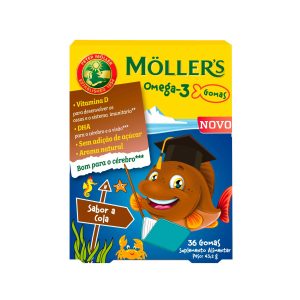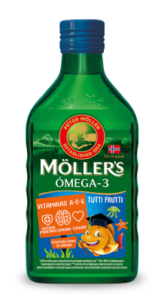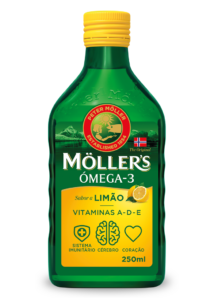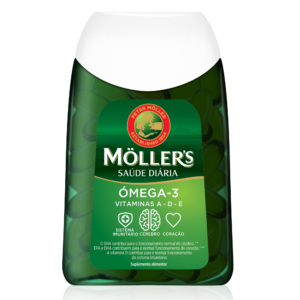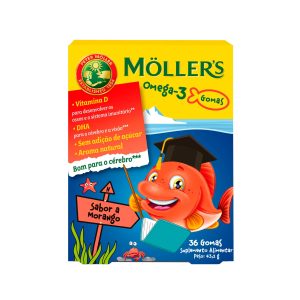You know cod liver oil is excellent for your baby’s development. But giving a baby cod liver oil is easier said than done. But maybe it’s easier than you think. Here are six tips that work.
Home » Six tips for giving baby cod liver oil
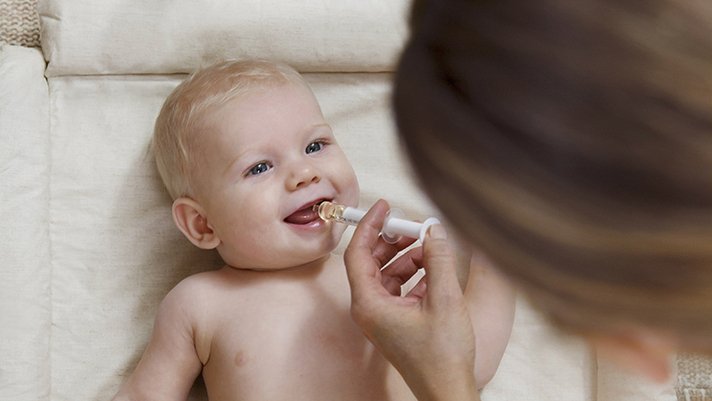
1.Avoid spills on clothes
Give babies cod liver oil on the changing table, in the bathroom or in other situations where they are naked. This way it doesn’t matter if they spill and regurgitate, and you avoid difficult stains. Maybe baby can be allowed to hold the spoon himself? That’s a real treat!
2.The syringe trick
Draw the cod liver oil into a plastic syringe (without a needle, of course) and release it gently into your baby’s mouth. Or let your baby suck on the syringe. Moller’s Easy Cod Liver Oil is a great tool available at any pharmacy. It’s a sort-of syringe that allows the cod liver oil to slide down baby’s throat.
3.Distract them
The hide-and-show trick, talking teddy bears, the brrrm brrrm car … there are endless possibilities for distracting babies while giving them cod liver oil. Sneak the spoon in while baby is laughing and chances are that the oil will be swallowed with no hard feelings.
4.Pretend they won`t get any
Reverse psychology works sublimely on toddlers. Let the rest of the family get the cod liver oil first and then eventually give your toddler a spoonful.
5.Make it cosy
Make the daily dose of cod liver oil a regular routine and combine it with an activity that your baby enjoys. Hug and play with baby and say what a good time you`re having and how good cod liver oil is. Although baby may not understand the words yet, she interprets the look and tone of your voice, and will associate being given cod liver oil with something nice.
6.Get rid of your own cod liver oil phobia
Some of us have prejudices against cod liver oil. We may have memories of it tasting and smelling bad and not want to impose something on our children that we didn`t like. However, the taste of cod liver oil has become much milder in recent years. Most babies are okay with cod liver oil. Some even like it. But remember it should be kept in the refrigerator and must not be so old that it turns rancid and tastes bad.
What is good health?
Do you have a good lifestyle?
Lifestyle simply means the way in which you live. Health and lifestyle go hand in hand. You might feel you have a good lifestyle if you are physically active, eat healthily and generally experience a sense of wellbeing. Conversely, if you want good health you should also have a good lifestyle.
Physical activity is the major contributor to a good lifestyle, but diet, drugs, stress, sleep and social conditions are also play an important role. Being able to use the body properly to avoid injury also affects lifestyle. Physical activity can also prevent depression and help you to recover more quickly from mental illness, both of which obviously affect your lifestyle.
Diet can be a difficult topic for many. Perhaps you eat too much or too little or maybe you find it hard to know what foods to combine to have a balanced diet. It’s also important to eat food that contains important vitamins, minerals and dietary fibre, omega-3 and antioxidants. On top of all this, you also need to get enough energy, protein and the correct fatty acids. The requirement for these nutrients changes throughout your life. When you are older you also have different requirements than children and younger adults. Women also have different requirements than men. Pregnant and breastfeeding mothers also have special requirements.
When you get older, you lose muscle mass and your body requires less energy and therefore less food. You may lead a less active life than you did before, which is why you require less food. However, your need for minerals, vitamins and other nutrients remains the same. Of course, there are plenty of healthy and active older people, but when you reach 70 to 80 years of age, it’s easier to become ill, especially during flu season.
Some steps you can take to improve your lifestyle and health are to:
- eat a healthy and varied diet
- stay active
- watch your weight
- avoid too much alcohol and don’t smoke
- get enough sleep
- think positive
- practise good hygiene
What is good quality of life?
The World Health Organisation (WHO) defines quality of life as a state where the individual can realise their potential, cope with normal stressful situations, work in a rewarding and positive way, and be able to contribute to others and society.
Quality of life is a wide and somewhat diffuse concept that includes joy in, and a desire for, life. These are values that are rather felt than measured, which in turn are based on personal environment and choices. Quality of life doesn’t necessarily depend on being healthy or sick. It’s the moments between worries, sorrows, problems and ailments that matter. For example, if you have a chronic illness, a feeling of mastery can be important when talking about quality of life.
To sum up, quality of life is a combination of health, lifestyle, networks and social support. It’s about experiencing joy, meaning in life, satisfaction, security and a sense of belonging, as well as being able to use your strengths. It’s also about feeling interest in life, coping with everyday situations and a being committed to something or someone. If you have good quality of life, you will be able to cope better with the inevitable stressful situations in life.
Learn more
Programa de exercícios para idosos
Healthy Aging Healthy Bones
Dieta saudável durante a gravidez
Brain Healthy Aging
Boa saúde, estilo de vida e qualidade de vida – O que tudo isso significa?
Cod Liver Oil Healthy Aging
